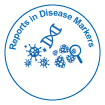Our Group organises 3000+ Global Conferenceseries Events every year across USA, Europe & Asia with support from 1000 more scientific Societies and Publishes 700+ Open Access Journals which contains over 50000 eminent personalities, reputed scientists as editorial board members.
Open Access Journals gaining more Readers and Citations
700 Journals and 15,000,000 Readers Each Journal is getting 25,000+ Readers
Useful Links
Share This Page
Editorial Board
Submit Manuscript
If you are interested in publishing with us or have any questions, please feel free to contact us directly on WhatsApp .
About the Journal
Reports in Disease Markers is an Open Access academic journal, which provides quick access to quality scientific manuscripts on physical and biological markers, parameters or substances that can indicate the presence of a disease and its possible health outcomes. This journal is an excellent platform for the exchange of ideas and concepts in all areas of disease biomarker research.
Reports in Disease Markers Journal allows its readers to freely access quality scientific articles that accentuate scientific research in varied aspects of the rapidly growing field of disease biomarker research. The journal publishes articles in the form of research articles, reviews, short communications, commentaries and letters to the editors, Research Notes, Study Protocols and letters to the editors, PPT presentations, etc.
Reports in Disease Markers Journal mainly focus on the publication of articles on the clinical importance of different disease markers viz. autoimmune disease markers, cardiovascular disease markers, infectious disease markers, celiac disease markers, molecular biomarkers, biomarkers for bipolar disorder, autism biomarkers, cytogenic biomarkers and individual health biomarkers. The journal also aims towards publishing original manuscripts that highlight recent research developments pertaining to biomarkers in reproduction, lactation and infertility, kidney biomarkers, biomarkers in diabetes, cancer biomarker, etc.
Kidney Biomarkers
Kidney biomarkers help in the assessment of the fact that whether the kidney is in a proper state or not. Kidney diseases evolve gradually over a period of time. Thus, it is crucial to check for the presence of various biomarkers pointing towards the possible occurrence of renal diseases. This will ensure the timely diagnosis of the diseases and ensure its proper treatment. While Glomerular filtration rate is the ideal biomarker, it is time consuming. Certain other biomarkers in this category include Kidney injury molecule, Neutrophil gelatinase-associated lipocalin, Asymmetric dimethylarginine, albuminuria, serum creatinine and cystatin C.
Related Journals of Kidney Biomarkers
Disease Markers, Journal of Biomarkers, Journal of Circulating Biomarkers, Journal of Molecular Biomarkers and Diagnosis, Biomarkers and Genomic Medicine, Biomarker Research, The Open Biomarkers Journal, Biomarkers in Medicine
Biomarkers in Diabetes
Diabetes is a major lifestyle disease and a leading cause of cardiovascular diseases. It is necessary to identify the potential biomarkers associated with diabetes for the early detection of the disease and its proper management. Elevated blood pressure, low HDL cholesterol, and elevated triglycerides are some of the common biomarkers of diabetes, adiponectin, C-reactive protein (CRP), ferritin, interleukin-2 receptor A being the other counterparts. Apart from these available and known biomarkers, other potential biomarkers are also being searched and reported by researchers.
Related Journals of Biomarkers in Diabetes
Disease Markers, Journal of Biomarkers, Journal of Circulating Biomarkers, Journal of Molecular Biomarkers and Diagnosis, Biomarkers and Genomic Medicine, Biomarker Research, The Open Biomarkers Journal, Biomarkers in Medicine
Biomarkers in Clinical Development
Biomarkers are intended to replace the surrogate endpoints in clinical trials. Surrogate markers are used to conduct clinical trial and gather a good number of endpoints which is impractical when the primary end point is undesired or the event number is very small. The Biomarkers help in the diagnostics and the Biomarkers help in the clinical development processes. Biomarkers case study plays an important role in finding and using new treatments to the patients who are in need and new drugs can be used widely in various clinical practices. • Biomarkers and surrogate endpoints for clinical trails • Diagnostics and Biomarker development • Biomarkers as Part of the Clinical Development Process • Biomarkers and Veterinary Medicine
Related Journals of Biomarkers in Clinical Development
Journal of Circulating Biomarkers, Journal of Molecular Biomarkers and Diagnosis, Biomarkers and Genomic Medicine, Biomarker Research, The Open Biomarkers Journal, Disease Markers, Journal of Biomarkers, Cancer Biomarkers, Biomarkers in Medicine Journal
Protein Biomarkers
Protein Biomarkers are effective tools in disease Diagnostics and drug discovery process. Protein biomolecules comprising of Proteome are measured qualitatively and quantitatively and serve as indicators of normal biological processes, pathogenic processes or pharmacological responses to therapeutic intervention. Protein Biomarkers serve the following purpose in • Diagnostic Prognostic and Predictive approach • Enabling Translational and Personalized Medicine
Related Journals of Protein Biomarkers
Biomarkers and Genomic Medicine, Biomarker Research, Disease Markers, , The Open Biomarkers Journal Journal of Biomarkers, Journal of Circulating Biomarkers, Journal of Molecular Biomarkers and Diagnosis, The Open Biomarkers Journal
Cellular Reactive oxygen species markers
Oxidative stress is the result of biological processes of oxidation-reduction reactions that generate harmful Reactive oxygen species (ROS), peroxides and free radicals. The imbalance between the concentrations of ROS and antioxidant buffer in the target tissue leads to oxidative stress. Biomarkers associated with the Inflammatory and Oxidative stress pathways have been implicated in various disorders, such as cancer, cardiovascular disease, lung disease including asthma and chronic obstructive pulmonary disease.
Related Journals of Reports in Disease Markers
Redox Biology, Oxidative stress, Biomarkers and Genomic Medicine, Journal of Circulating Biomarkers, Journal of Molecular Biomarkers and Diagnosis, The Open Biomarkers Journal, Biomarker Research, Disease Markers, , The Open Biomarkers Journal Journal of Biomarkers.
Nutritional Biomarkers
Nutritional biomarkers are biochemical, functional or clinical indices of nutrient intake, status, or functional effects that are needed to support evidence based clinical guidance and effective health programs and policies related to food, nutrition and health. Such indices can reveal information about biological or physiological responses to dietary behaviour or pathogenic processes, and can be used to monitor responses to therapeutic interventions and to provide information on inter individual differences in response to diet and nutrition. The availability of nutritional biomarkers that estimate intake of specific foods and dietary components could greatly enhance nutritional research targeting compliance to national recommendations as well as direct associations with disease outcomes.
Related Journals of Nutritional Biomarkers
Journal of Nutrition and Dietetics, Journal of Nutrition and Food Sciences, Nutrition Journal , The Journal of Nutrition, The Journal of Nutrition, European Journal of Clinical Nutrition, Nutrition and Cancer Journal.
Forensic Biomarkers
Forensic chemical/biochemical analysis is an essential tool in the criminal justice system, particularly when examining physical evidence to support criminal investigations and subsequent prosecutions. A biochemistry/molecular biology-based subarea of forensic analysis, forensic serology, deals with the complex task of gathering information on the type of sample, age, origin, or sex from biological fluids found at a crime scene. Forensic biomarkers are biochemical profiling of the samples found at the crime scene for further investigations.
Related Journals of Forensic Biomarkers
Biomarkers in Pharmacology
Pharmacology is a branch of biology and medicine which deals with the drug actions which creates a biological or physiological effect in the cell, organ or the organism. Biomarkers are the quantitative measurable indicators of the biological processes, therapeutic responses or the pathogenic responses which helps in the study of pharmacology. Thus Biomarkers help in the prediction of the biological reactions that takes place inside the organism, making the drug development process easy.
Related Journals of Biomarkers in Pharmacology
Pharmacodynamic Biomarkers, Biomarkers and Genomic Medicine, Journal of Circulating Biomarkers, Journal of Molecular Biomarkers and Diagnosis, The Open Biomarkers Journal, Biomarker Research, Disease Markers, , The Open Biomarkers Journal Journal of Biomarkers.
Metabolic Biomarkers
Metabolite profiling in conditions such as cardiovascular, Diabetes, and in complex disorders serve as metabolic biomarkers in disease diagnosis, prognosis and prediction. Biomarkers associated with metabolite variation in pathogenic conditions are the measurable indices in diagnosis of disease condition and help in the drug development and validation process. Metabolomics research advanced the discovery of large number of metabolite biomarkers involved in the abnormal metabolic pathways.
Related Journals of Metabolic Biomarkers
Pharmacodynamic Biomarkers, Biomarkers and Genomic Medicine, Journal of Circulating Biomarkers, Journal of Molecular Biomarkers and Diagnosis, The Open Biomarkers Journal, Biomarker Research, Disease Markers, , The Open Biomarkers Journal Journal of Biomarkers
Transcriptional Profiling
Transcriptomics is the study of the RNA transcripts (transcriptome) that are produced by the genomes under certain circumstances using high-throughput techniques like microarray analysis. Transcriptional profiling is a technique used to identify the differences in the gene expression between the diseased tissues and the healthy tissues. DNA sequencing, mRNA profiling, Proteomics, and Systems Biology help in the analysis of the transcriptional profiling. Expressed sequence tags and DNA microarrays are the techniques that are used in transcriptional profiling. Transcription analysis and transcriptional profiling Gene expression analysis in biomarker research, Microarray data analysis.
Related Journals of Transcriptional Profiling
Pharmacodynamic Biomarkers, Biomarkers and Genomic Medicine, Journal of Circulating Biomarkers, Journal of Molecular Biomarkers and Diagnosis, The Open Biomarkers Journal, Biomarker Research, Disease Markers, , The Open Biomarkers Journal Journal of Biomarkers
Biomarkers and Radiology
Biomarkers are detectable parameters which can be biochemical, genetic, histologic, anatomic, physical, functional, or metabolic. They are detected as an image which helps in the diagnosis of the disease that is involved in it. Imaging biomarkers are used in clinical analysis. It promotes research and also leverage advances in bioinformatics. Imaging biomarkers Quantitative imaging biomarkers
Related Journals of Biomarkers and Radiology
Journal of Molecular Biomarkers and Diagnosis, The Open Biomarkers Journal, Biomarker Research, Disease Markers, The Open Biomarkers Journal, Journal of Biomarkers Pharmacodynamics Biomarkers, Biomarkers and Genomic Medicine, Journal of Circulating Biomarkers
Biomarkers for Toxicity Prediction
Biomarkers are used for the prediction of Toxicity because these biomarkers act as an indicator when there is a toxic response that takes place in the system. Many qualified biomarkers are being used to predict and detect the toxic reactions that occur in the body. There are many translational biomarkers used in the study of toxins that plays a crucial role in the toxicity prediction.
• Next generation biomarkers for predicting toxicity
•Translational Biomarkers in toxicology
• Biomarkers as indicator of toxicity in clinical trails
Related Journals of Biomarkers for Toxicity Prediction
Journal of Molecular Biomarkers and Diagnosis, The Open Biomarkers Journal, Biomarker Research, Disease Markers, The Open Biomarkers Journal, Journal of Biomarkers Pharmacodynamics Biomarkers, Biomarkers and Genomic Medicine, Journal of Circulating Biomarkers
Cardiovascular Disease Markers
Coronary artery disease, arrhythmia, congenital heart disease, etc. are all considered as cardiovascular diseases and are associated with the distorted functioning of the blood vessels or the heart. Physiological factors such as glucose and hormone levels, lipid profile, low LDL levels, serum-ferittin level, and impaired sterol efflux are considered as potential markers of the occurrence of cardiovascular diseases. The presence of these markers predict the possibility of occurrence of cardiovascular diseases.
Related Journals of Cardiovascular Disease Markers
Disease Markers, Journal of Biomarkers, Journal of Circulating Biomarkers, Journal of Molecular Biomarkers and Diagnosis, Biomarkers and Genomic Medicine, Biomarker Research, The Open Biomarkers Journal
Autoimmune Disease Markers
The antinuclear antibody test, anticardiolipin test, anticentromere test, etc. are often used to detect the presence of autoantibodies, which are basically the markers for various autoimmune diseases. Formation of autoantibodies by the immune system is due to its failure in differentiating self from non-self and hence it starts attacking its own cells, tissues and organs.
Related Journals of Autoimmune Disease Markers
Disease Markers, Journal of Biomarkers, Journal of Circulating Biomarkers, Journal of Molecular Biomarkers and Diagnosis, Biomarkers and Genomic Medicine, Biomarker Research, The Open Biomarkers Journal
Infectious Disease Markers
To check whether a person is suffering from an infectious disease or not e.g. viral diseases, a primary screening for the presence of viral elements in the body fluids is done. Presence of virus specific antibodies against HIV, Hepatitis B and C viruses, cytomegalovirus, herpes simplex virus, Epstein-Barr virus are certain markers that predict the occurrence of infectious diseases.
Related Journals of Infectious Disease Markers
Disease Markers, Journal of Biomarkers, Journal of Circulating Biomarkers, Journal of Molecular Biomarkers and Diagnosis, Biomarkers and Genomic Medicine, Biomarker Research, The Open Biomarkers Journal
Celiac Disease Markers
It is a hereditary autoimmune disorder where the small intestine is damaged due to gluten uptake. Some of the various celiac disease markers are anemia, vitamin and iron deficiency, imbalance in the levels of electrolyte, calcium and protein, abdominal pain, etc. Additionally, anti-tissue transglutaminase antibodies, endomysial antibodies and deamidated gliadin peptide antibodies are also potential markers of celiac disease.
Related Journals of Celiac Disease Markers
Disease Markers, Journal of Biomarkers, Journal of Circulating Biomarkers, Journal of Molecular Biomarkers and Diagnosis, Biomarkers and Genomic Medicine, Biomarker Research, The Open Biomarkers Journal
Cancer Disease Biomarkers
The marker for cancer varies depending on the type of cancer. Different types of cancer have different types of biomarkers that state the presence of that particular type of cancer in the patients. The most commonly studied biomarkers of cancer include gene mutations, gene rearrangements, missing genes, extra copies of genes and other molecules.
Related Journals of Cancer Disease Biomarkers
Disease Markers, Journal of Biomarkers, Cancer Biomarkers, Biomarkers in Medicine Journal, Journal of Circulating Biomarkers, Journal of Molecular Biomarkers and Diagnosis, Biomarkers and Genomic Medicine, Biomarker Research, The Open Biomarkers Journal
CardioRenal Biomarkers
Cardio renal disorders are associated with the simultaneous and correlated malfunctioning of heart and kidney. Cardio renal biomarkers consist of cardiac troponins, Natriuretic peptides, Urine albumin, creatinine, cystatin C and neutrophil gelatinase-associated lipocalin.
Related Journals of CardioRenal Biomarkers
Disease Markers, Journal of Biomarkers, Journal of Circulating Biomarkers, Journal of Molecular Biomarkers and Diagnosis, Biomarkers and Genomic Medicine, Biomarker Research, The Open Biomarkers Journal, Biomarkers in Medicine
Journal Highlights
Fast Editorial Execution and Review Process (FEE-Review Process):
Reports in Disease Markers is participating in the Fast Editorial Execution and Review Process (FEE-Review Process) with an additional prepayment of $99 apart from the regular article processing fee. Fast Editorial Execution and Review Process is a special service for the article that enables it to get a faster response in the pre-review stage from the handling editor as well as a review from the reviewer. An author can get a faster response of pre-review maximum in 3 days since submission, and a review process by the reviewer maximum in 5 days, followed by revision/publication in 2 days. If the article gets notified for revision by the handling editor, then it will take another 5 days for external review by the previous reviewer or alternative reviewer.Acceptance of manuscripts is driven entirely by handling editorial team considerations and independent peer-review, ensuring the highest standards are maintained no matter the route to regular peer-reviewed publication or a fast editorial review process. The handling editor and the article contributor are responsible for adhering to scientific standards. The article FEE-Review process of $99 will not be refunded even if the article is rejected or withdrawn for publication.
The corresponding author or institution/organization is responsible for making the manuscript FEE-Review Process payment. The additional FEE-Review Process payment covers the fast review processing and quick editorial decisions, and regular article publication covers the preparation in various formats for online publication, securing full-text inclusion in a number of permanent archives like HTML, XML, and PDF, and feeding to different indexing agencies.

 Spanish
Spanish  Chinese
Chinese  Russian
Russian  German
German  French
French  Japanese
Japanese  Portuguese
Portuguese  Hindi
Hindi 


